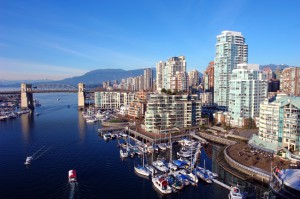British Columbia Launches Express Entry Immigration Stream: No Job Offer Needed For Certain Students
 The Canadian province of British Columbia (B.C.) has added a new stream to its British Columbia Provincial Nominee Program (BC PNP) for Canadian immigration called Express Entry British Columbia. This stream allows the province to nominate 1,350 more candidates for Canadian permanent residence through the BC PNP than was the case in 2014.
The Canadian province of British Columbia (B.C.) has added a new stream to its British Columbia Provincial Nominee Program (BC PNP) for Canadian immigration called Express Entry British Columbia. This stream allows the province to nominate 1,350 more candidates for Canadian permanent residence through the BC PNP than was the case in 2014.
The new stream, which aligns with the federal government’s Express Entry immigration selection system, should significantly reduce application processing times. The Express Entry British Columbia stream allows eligible applicants to receive priority processing of both their B.C. PNP application, and if nominated, their permanent residence application.
Potential candidates will have to meet minimum provincial eligibility criteria for one of the following categories under the B.C. PNP:
- International Post Graduates
- International Graduates
- Skilled Workers (including Health Care Professionals)
In addition, candidates must also be eligible for one of the federal economic immigration programs in order to enter the Express Entry pool:
The federal economic immigration programs require candidates to meet a mandatory language proficiency level and demonstrate sufficient funds to support the applicant and their family on arrival in Canada. Candidates eligible under the Federal Skilled Worker Program are also required to submit the results of an Educational Credential Assessment.
Apply without a job offer: The International Post Graduate Category
B.C. employers are seeking workers with graduate degrees in the sciences, and the government of B.C. has reacted accordingly. Candidates do not require a job offer in order to be eligible under the International Post Graduate category.
Individuals with a master’s or doctoral degree in the sciences received within the past two years from an eligible program at a post-secondary institution in B.C. may be eligible to apply under the International Post Graduate category, as long as the post graduate degree was obtained in one of the following natural, applied or health sciences:
- Agriculture
- Biological and biomedical sciences
- Computer and information sciences and support services
- Engineering
- Engineering technology
- Health professions and related clinical sciences
- Mathematics and statistics
- Natural resources conservation and research
- Physical sciences
Candidates must provide evidence of their intention to reside in B.C. This evidence may include:
- the length of any previous and/or current period of residence in B.C.;
- connections to B.C. through work, study or family; and/or
- a description of any actions taken to settle in B.C., such as finding a job or place to live.
International Graduates Category
International graduates who have graduated from a Canadian university or college within the past two years may be eligible to apply under the International Graduates category. Candidates applying under the International Graduates category must have a full-time permanent qualifying job offer in a skilled occupation from a B.C. employer.
Candidates eligible under this category must have a degree, diploma or certificate from a recognized post-secondary institution in Canada. Diplomas and certificates obtained from private institutions are not eligible under this category. The program must have entailed at least eight months (two semesters) of full-time study. Candidates who spent more than one-quarter of the program time in a co-op work term or internship are not eligible under the Graduates category.
Skilled Worker Category (including Health Care Professionals)
The Skilled Worker category is for international skilled workers who have post-secondary education or training and employment experience in a professional, management, technical, trade or other skilled occupation. The candidate’s occupation must be classified under the National Occupational Classification (NOC) matrix as skill level 0, A, or B.
Candidates applying under the Skilled Worker category must have a full-time permanent qualifying job offer in a skilled occupation from a B.C. employer. Candidates with a job offer in a regulated occupation that requires mandatory certification or licensing must demonstrate that they meet provincial requirements for the particular occupation when they make their application under this category.
A particular sub-category of the Skilled Worker category is the Health Care Professionals category. Foreign health care workers with a full-time job offer from a Public Health Authority in B.C., directly related work experience and applicable licensing may be eligible if their occupation is one of the following:
- Physicians
- Specialists
- Registered nurses
- Registered psychiatric nurses
- Nurse practitioners
- Allied health professionals such as:
- Diagnostic medical sonographers
- Clinical pharmacists
- Medical laboratory technologists
- Medical radiation technologists
- Occupational therapists
- Physiotherapists
Physicians and specialists must be sponsored by one of B.C.’s five regional health authorities or the Provincial Health Services Authority.
Candidates with a nursing occupation must be registered with the College of Registered Nurses of BC or, for psychiatric nurses, the College of Registered Psychiatric Nurses of BC.
Midwives must be registered with the College of Midwives of British Columbia and have a letter of confirmation an established practice group in British Columbia confirming their acceptance into the group as an affiliated midwife for a period of at least six months.
Allied health professionals must be registered with the relevant provincial licensing body that regulates their profession.
British Columbia: An Immigration Destination
“British Columbia is not only one of the most desirable destinations in Canada, it is one of the most desirable destinations in the world. From the Rockies to the Pacific Ocean, from the Northern wilderness to the wonderful metropolis that is Vancouver — B.C. truly has it all,” says Attorney David Cohen.
“The immediate immigration outlook for B.C. is positive. The 1,350 additional spaces that the province may use to expedite applications through the federal Express Entry system compliments an already dynamic and generous Provincial Nominee Program.”
To find out if you are eligible for any of over 60 Canadian immigration programs, including immigration streams under the British Columbia Provincial Nominee Program, please fill out a free online assessment today.
British Columbia quick facts
Capital: Victoria
Largest city: Vancouver
Population: 4,610,000
Languages: English is spoken by the vast majority of B.C. residents, with Chinese languages also being spoken by many, particularly in the Greater Vancouver area.
Climate: Coastal areas of B.C. are among the mildest in Canada, with rainy winters and warm, but rarely hot, summers. The Lower Mainland experiences hotter and drier conditions, though winters in elevated areas can be cold and snowy. Northern and central inland areas are generally colder, with many towns and regions enduring severe winters.
Learn more about British Columbia
© 2015 CICnews All Rights Reserved
- Do you need Canadian immigration assistance? Contact the Contact Cohen Immigration Law firm by completing our form
- Send us your feedback or your non-legal assistance questions by emailing us at media@canadavisa.com



